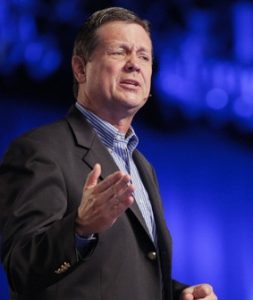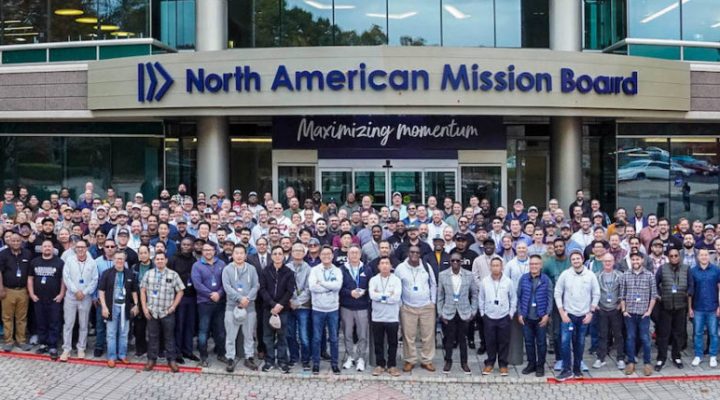Bobby Gilstrap seemed to model what Southern Baptists would want in a denominational leader. Educated at two Southern Baptist Convention seminaries, he served as a pastor, then served 10 years as an associational director of missions in Michigan, where he was a champion for church planting.
Then in 2011, he became executive director of the Baptist State Convention of Michigan, one of the smaller state conventions associated with the SBC and a place with a long history of interdependence with the SBC’s North American Mission Board and its predecessor, the Home Mission Board.

Bobby Gilstrap
“I served there 14 years,” he said. “I was an associational missionary for NAMB for 10 years and led the state for another four. Everything seemed to be going fine.”
In time, he was offered a position with NAMB to lead their department working with associational directors of missions. He turned down that opportunity to become the state executive instead.
A change in strategy
All this happened at the same time massive changes were rolling out of NAMB’s headquarters in Alpharetta, Ga., as NAMB President Kevin Ezell changed the partnership agreements between the national body and the state conventions, pulling back previously shared funding for church planting to use in a national strategy controlled solely by NAMB.
That drew criticism from a number of state convention executives, particularly of smaller conventions without the financial resources to go it alone. Resistance to this shift is at the heart of Will McRaney’s seven-year-old lawsuit against Ezell and NAMB for defamation. McRaney claims he was fired as executive director of the Baptist Convention of Maryland and Delaware because Ezell demanded his firing and threatened to withhold $1 million in funding if the state Executive Board didn’t do what he wanted.
Neither Ezell nor NAMB leaders have denied that Ezell wanted McRaney out of the way. They claim, instead, that all this amounts to internal church workings that are outside the purview of secular courts.
McRaney’s story, by now, is well known. Gilstrap’s story is not.
From hero to zero
In a relatively short period of time, Gilstrap went from being someone pursued by Ezell to a staff position in Alpharetta to being someone who couldn’t get a phone call returned, the former state leader said.
Gilstrap was pushed out of the state leadership role in 2014 after he was branded as uncooperative with Ezell and NAMB.

Kevin Ezell
Ezell, who later would call McRaney a “nutcase” and urge other organizations not to hire him as a consultant or speaker, did the same thing to Gilstrap, both Gilstrap and another witness have testified.
Larry Cheek, associational missionary for Stone Mountain Baptist Association of Churches in Georgia, has publicly stated that Ezell called him in 2016 and urged him not to hire Gilstrap as a church planting strategist.
Cheek asked why and was told Gilstrap had been “very uncooperative” with NAMB. Cheek testified that he made other calls to verify Ezell’s story and heard a completely different account of Gilstrap’s competency and effectiveness.
The back story
After Gilstrap had declined to move forward in pursuit of the NAMB job, he sought repeatedly to get Ezell to visit his state and meet with pastors and church planters. According to Gilstrap, Ezell repeatedly declined to come to Michigan even though he was visiting other states.
“Kevin started pushing me off to other vice presidents,” he said in an interview. “I could still contact him, but he would rarely talk with me directly.”
The problem, Gilstrap believes, is that he was not a fan of Ezell’s plan to consolidate church planting strategy and funding in Alpharetta.
“It was evident pretty quickly that centralized control was kind of what they were after. It didn’t sit well with me.”
“After I got started and they started unveiling all that they were going to do and all the shifts, it was evident pretty quickly that centralized control was kind of what they were after,” Gilstrap said. “It didn’t sit well with me.”
In Michigan, “we were very anti-parachute, of somebody bringing in a bunch of money and trying to plant a church,” he explained. “It just wasn’t the strategy. I’d spent 10 years at that point in the area doing church planting, and we had the highest percentage of success with church plants in my area.”
It took the intercession of the executive director of a larger state convention in partnership with Michigan to get Ezell to Michigan for what turned out to be a half-day visit.
Neverthless, Gilstrap said he decided to make the most of Ezell’s time.
“He came in at 8:00 in the morning and flew out at 3:00, so we didn’t have much time with him. But we made the most of the time and even made sure that he had the snacks that he likes, Diet Coke and trail mix, waiting for him when he came in that morning. We wanted to make sure he knew we were grateful for his time.”
That day, Ezell met with church planters and shared his vision for NAMB’s new strategy. Then he opened the floor for questions.
“The questioning was kind of pointed, and he failed at answering some of the questions.”
“By this time, there were a lot of our folks who were pretty upset with the things that were happening, the shifting of all the DOMs to church planting catalysts,” Gilstrap recalled. “The questioning was kind of pointed, and he failed at answering some of the questions. After his brief time, he thanked everyone for being there and said he looked forward to being partners. He headed out, and everyone else stayed there.”
Gilstrap and a church planter drove Ezell to the airport to catch his flight home.
The mood was not good, Gilstrap said. “The whole time, he made no eye contact with me in the car, which I thought was strange. As I was pointing things out to him in the car, he kept looking outside the window not saying anything. I thought maybe he would respond to the church planter I brought with me in the car, and he ignored him too. I thought to myself, ‘This was just incredible. He doesn’t want to be here. He feels forced to be here, and he’s trying to be polite because he knows he needs to be polite.’ I can remember telling the state staff after the visit, ‘I don’t think the visit helped us at all. He didn’t ask a single question when he was here about our work.’”
Neverthless, Gilstrap said, he continued to go about his work in Michigan.
Secret meetings
“I was fighting to try to keep our staff, but Ezell was defunding all these people. He said, ‘If they’re not funded according to the strategy we’re doing, we’re not funding them.’ And so, I spent many hours and days fighting for these guys, trying to keep them on board, and of course, we lost. We didn’t have any strength. We had 300-plus churches total, and the majority of them were under a hundred.”
Later Gilstrap learned he had been the subject of secret meetings held to undermine his leadership in the state.
“I got that sense, you know, something’s going on, but I couldn’t figure it out.”
“I got that sense, you know, something’s going on, but I couldn’t figure it out. I was probably far more naive, because I was a very trusting person. I’d been around the church and served with some great Christian servants. My dad was a DOM, so I’ve been around denominational life, so I’d seen stuff happen, but I was still a trusting person.”
Eventually, he was informed by his own trustees that he would be evaluated because he was unable to cooperate with NAMB. That charge came to a head when Gilstrap was invited to a trustee’s home and asked to resign.
“They said to me that NAMB had said I was too difficult to work with,” he recounted.
And that label stuck with him for years, even as he interviewed for the part-time job as leader of the Urban Atlanta Church Planting network led by Stone Mountain Association with three other associations. It was then he learned from Cheek that Ezell was working against him being hired.
He had been looking for work, but nothing ever materialized. “I would have associations reach out to me, but after the search, they would all say I wasn’t the right fit.”
Today, he’s moved on. He has started his own church consulting ministry, Dynamic Church Ministries, and even hosts a podcast focused on denominational issues such as the goings on at NAMB.
“There’s some good people at NAMB who are really trying to do good kingdom work, and some of them, I think, are blind to what is really happening.”
Bill Barker’s similar story

Bill Barker
Gilstrap’s story not only resonates with McRaney’s experience but also with the experience of Bill Barker, who served as a NAMB missionary for 17 years overseeing Appalachian Regional Ministries, whose primary mission was to minister to an underserved people group in the Appalachian region, including the Mississippi Delta.
“I was a hybrid, meaning the state executive directors got together from the Appalachian region and said we need to form a ministry similar to the Mississippi River Ministry to meet the needs of persons living in Appalachia,” Barker explained. “They formed the ministry, with each state having equal power, and they invited the WMU and the North American Mission Board to participate with them. So that in the end, I had 13 state conventions that had come together by mutual agreement.
“They renewed that agreement from time to time. I would meet with the state executive directors, and they would renew that, and the North American Mission Board and the Woman’s Missionary Union all sat at the table and no one had more power than the other. It was a great union.”
That is, until Ezell came to lead NAMB, Barker said.
“There were also attempts, behind the scenes, to let me go. However, I had the backing of the other state conventions.”
“I noticed the change immediately. In December 2011, I was called in and told NAMB was taking over Appalachian Regional Ministry. There were also attempts, behind the scenes, to let me go. However, I had the backing of the other state conventions. Thankfully, the other state convention leaders had a conversation that allowed me to keep doing ministry for a season.”
However, things took a wrong turn in 2017, when “a sizable donation of money” was given to Clear Creek Baptist Bible College in Pineville, Ky., through Appalachian Regional Ministry, Barker testified under oath in a deposition for the McRaney case.
“When Mr. Ezell found out about the donation, he became angry, fired off a number of heated text messages (that he continued sending until after midnight), and had the ARM website shutdown. I was told the next morning that Ezell had instructed the IT staff to shut down the website around midnight.”
He explained: “My life was made miserable after that in terms of working with NAMB management. I was restricted from working with certain ministries and schools that Ezell did not like (such as CCBBC) and ministries that were loosely connected with the Southern Baptist Convention. As director, seemingly every decision I made was challenged and at least once every four to six months I was called in for the purpose of dismissal. As a ministry, ARM belonged to the state executive directors, not to NAMB. When I was told by NAMB personnel that I was subject to termination, I called Dr. Robert White, state executive director for the Georgia Baptist Convention. He then called the other state executive directors and then called Ezell telling him to back off.”
Soon, Barker said, he was told by an intermediary that if he sought help from the state executives again, not only would he be fired but two other NAMB employees would be fired by Ezell “in retaliation.”
Instead, Barker “was forced into early retirement,” he testified.
Barker does not mince words in his assessment of Ezell: “Kevin’s a narcissist who works through the art of intimidation. I think that’s the best way to describe him. Kevin will first embarrass you in public, and then go behind your back and get others to put pressure on you — others, by the way, who are doing the work for him. Then, you’re going to be caught in the crossfires of it, and it’s set up by design.”
Today, what upsets Barker the most is the ministry that no longer is being done in Appalachia — children no longer being helped because of the political machinations of the SBC.
Editor’s note: Ezell and NAMB’s communication office have a longstanding policy of not responding to press inquiries about controversial issues. If a response is received, BNG will publish it.
Related articles:
Key witness offers damning testimony against Ezell as NAMB gets McRaney trial delayed two months
‘Un-friendly’ fire in the Southern Baptist Convention unearths layers of deceit, resurfaces old wounds | Opinion by Joni Hannigan


